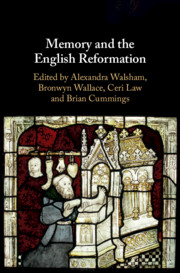Book contents
- Memory and the English Reformation
- Memory and the English Reformation
- Copyright page
- Dedication
- Contents
- Figures
- Contributors
- Preface and Acknowledgements
- Abbreviations
- Introduction
- Part I Events and Temporalities
- Part II Objects and Places
- Part III Lives and Afterlives
- 13 Compromise Refashioned
- 14 History, Heresy and Henry V
- 15 The Letters of the Martyrs
- 16 Competing Lives and Contested Objects
- 17 Visual Memory, Portraiture and the Protestant Credentials of Tudor and Stuart Families
- 18 Legends, Shrines and Ruined Tombs
- Part IV Rituals and Bodies
- Index
14 - History, Heresy and Henry V
from Part III - Lives and Afterlives
Published online by Cambridge University Press: 30 October 2020
- Memory and the English Reformation
- Memory and the English Reformation
- Copyright page
- Dedication
- Contents
- Figures
- Contributors
- Preface and Acknowledgements
- Abbreviations
- Introduction
- Part I Events and Temporalities
- Part II Objects and Places
- Part III Lives and Afterlives
- 13 Compromise Refashioned
- 14 History, Heresy and Henry V
- 15 The Letters of the Martyrs
- 16 Competing Lives and Contested Objects
- 17 Visual Memory, Portraiture and the Protestant Credentials of Tudor and Stuart Families
- 18 Legends, Shrines and Ruined Tombs
- Part IV Rituals and Bodies
- Index
Summary
This chapter examines the figure of Henry V in Reformation-era histories from William Tyndale to William Shakespeare. It charts the efforts of first- and second-generation Protestants like William Tyndale, John Bale, John Foxe and others to overturn admiring impressions left by contemporary writers including Thomas Walsingham and Thomas Hoccleve, and picked up by later chroniclers such as Robert Fabyan, Polydore Vergil, Edward Hall and the Holinshed collaborators. What emerges is no single ‘Protestant’ interpretation of Henry as king, which reflects the challenges evangelicals encountered in this historical revisionism. Unlike Henry II and King John, whose battles with the Roman church provided ample fodder for reformers, Henry V’s narrative of domestic prosperity and military success, all while ostentatiously promoting religious orthodoxy, proved indelible. This chapter, then, will show that Henry was perceived ambivalently by many sixteenth-century historians, largely due to his persecution of religious dissenters. The only significant exception was Foxe the martyrologist, who took a strikingly independent line. Nevertheless, this chapter will show that the memory of Henry ultimately loomed too large for evangelical historians, proving that the remembered success of Henry’s reign outlasted critique even in England’s most influential history book, Foxe’s Acts and monuments.
- Type
- Chapter
- Information
- Memory and the English Reformation , pp. 271 - 285Publisher: Cambridge University PressPrint publication year: 2020

